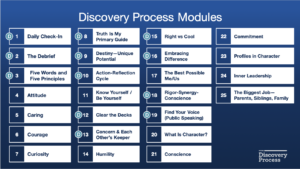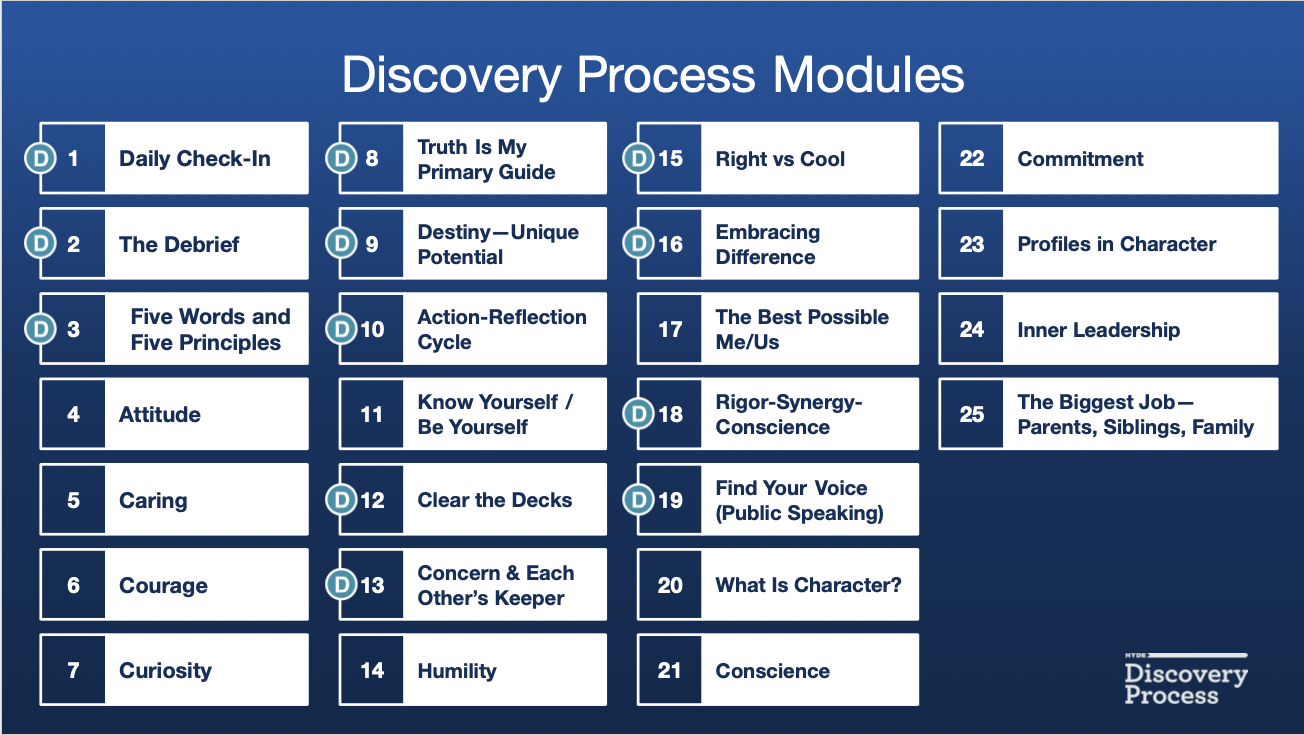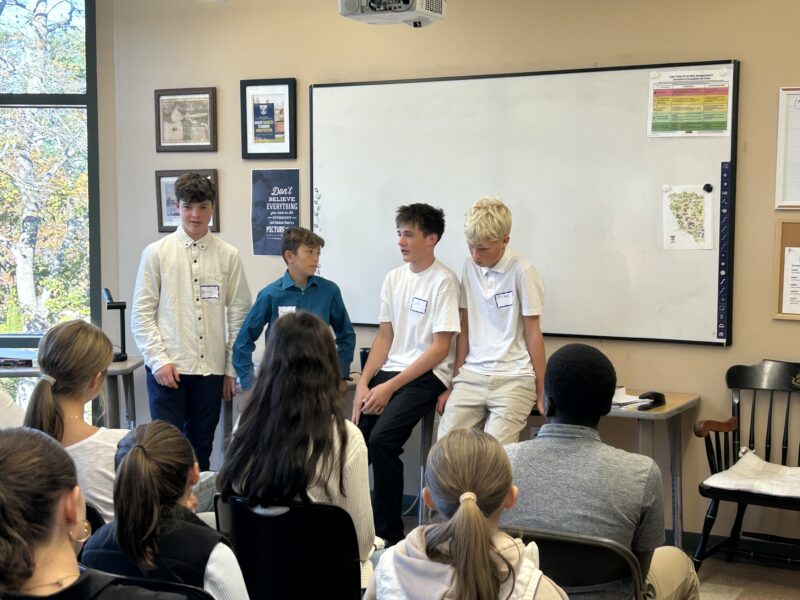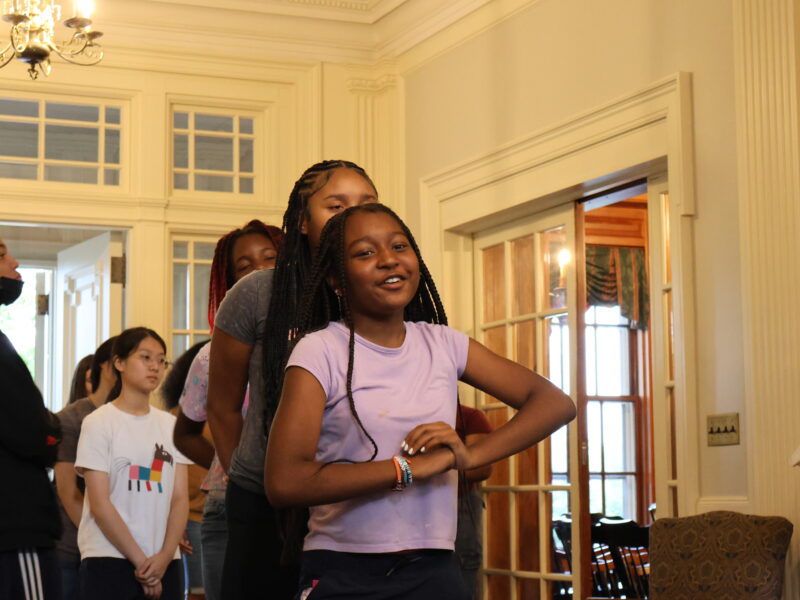
Here are a few sentences describing each of the 25 modules comprising the Hyde Discovery Process. Each module contains a 6-10 minute introductory video and four to six lessons.
- Daily Check-In – Perhaps the most critical activity in Discovery Process, the Daily Check-In provides the opportunity to take the collective temperature of the Discovery Group at the beginning of the school day.
- The Debrief – Just as the Daily Check-in and Clear the Decks are designed to get a new day or activity off to a strong start, The Debrief is intended to add a finishing touch at the end of an activity or the close of a day. It boils down to someone asking, “OK, Group, how did we do?”
- 5 Words & 5 Principles – This module offers an introduction to the common language aspect of the Discovery Process. Rather than impose specific definitions on our students, it facilitates their efforts to “try them on and walk around in them a bit.”
- Attitude – Whenever we find ourselves facing difficult times, it is natural to wish for a different set of circumstances. This module helps students learn to face such times with a different set of attitudes.
- Caring – Members of a caring community both encourage and challenge each other. They do not use their time together to settle personal scores or reinforce cliques. This module teachers group members to respect for each other and honor a commitment to the best in each other.
- Courage – Courage is the first of the Five Words for a reason. Whatever our circumstances, our goals demand that we muster the courage to take that first step. This module helps students examine, assess and begin to develop strategies for doing so.
- Curiosity – Most of us possess some level of curiosity about something. Most of us are also rather selective about applying curiosity. This module helps students explore and develop the notion of enterprising curiosity, the habit act of actively pursuing the answers.
- Truth is My Primary Guide – Truth alone will not produce genuine character development. (It would also make for a brutal school climate.) However, it may be the most critical element. This module can help keep Truth at the forefront of the Discovery Process.
- Destiny – Unique Potential – At the core of the Discovery Process is the belief that “every individual is gifted with a unique potential that defines a destiny.” Furthermore, our personal character controls the key to that potential. This module introduces this idea.
- Action-Reflection Cycle – This module introduces a four-stage process of personal growth where students: 1. Act… 2. Reflect (on that action)… 3. Visualize a new view of self. 4. Act in accordance with this new view of self and thereby establish a chain reaction of ongoing action-reflection.
- Know Yourself, Be Yourself – This module helps students understand more about their own strengths and challenges while finding the courage to be themselves. It is guided by three tenets: 1. We are all unique and aspire to be somebody of dignity and worth. 2. It takes courage to be ourselves. 3. We need to be supported and challenged by others.
- Clear the Decks – In any grouping of humans it is not uncommon for the simplest of personal issues to fester into uncomfortable and non-productive resentments. A little bit of “Clear the Decks” on the front end can prevent the harsh unleashing of resentments and hurtful gossip on the back end while contributing to a closer group throughout.
- Concern & Each Other’s Keeper (EOK) – Discovery Process students look out for each other. The EOK principle states: “We help others achieve their best.” EOK has been explained as the proper balance “between a bear hug and a kick in the pants.” This module delineates between the fine line dividing genuine caring and “getting up in each other’s business.”
- Humility – Rugged individualism is such a prevalent theme in films and in portrayals of the heroes of our pop culture that humility is sometimes perceived as a sign of weakness. We are not islands. On the road to success, nobody gets there alone, no matter what might happen in the movies. This module encourages students to value humility in their lives.
- Right vs. Cool – It is common for adolescents to feel conflicted between what is right and what is cool. This module presents lessons designed to help them with that balancing act.
- Embracing Difference –Over 200 years ago, the U. S. Congress affixed the motto E pluribus unum (“One from many”) to the Great Seal of the United States. It has proven a difficult concept for people to comprehend and act upon during the last two-plus centuries. This module presents lessons designed to help students and teachers internalize the critical connection between their own unique potential (the “one”) and that of their Discovery Group members, their schoolmates, and members of their larger community (the “many”).
- The Best Possible Me/Us –Discovery Process schools believe it is essential for students to have an understanding of their own personal best, irrespective of anyone else’s. This module helps students and their teachers explore this idea, one that can be unfamiliar territory for students who have been immersed in a traditional, GPA-conscious environment.
- Rigor-Synergy-Conscience (RSC) – RSC is a three-stage construct reflecting the evolution of personal growth and development in all people. Rigor reflects our initiative and striving to do our best. Synergy encompasses our capacity to ally and work with others. (A popular Discovery Process way of defining synergy is “1 + 1 = 3.”) Conscience reflects our inner moral guidance system. This module makes reference to all three stages of the construct.
- Find Your Voice (Public Speaking) – Watch any group of children engaged in nearly any activity on a school playground and you will see the key ingredient for effective public speaking. We call it the “playground voice.” This module introduces students and teachers to the basic elements—skills, techniques, attitudes—composing the playground voice.
- What is Character? – This question may be the cousin of What is Life? No one knows for sure. There is an endless reservoir of quotes on the subject, many of them anonymous. This module is designed to help you begin to develop a definition that works for you.
- Conscience –Emerging teenagers stand at a unique crossroads where they strive to balance the urge to pursue primitive wants with a newer, perhaps unfamiliar voice counseling truth and a higher purpose. This module introduces students to the idea that active conscience not only empowers all of us to hear our deepest inner voice, it inspires us to follow its lead.
- Commitment – A popular anonymous quote sums up the focus of this module: “Commitment means staying loyal to what you said you were going to do long after the mood you said it in has left you.” Commitments are easy to make and hard to keep. It can be extremely difficult to maintain our commitments when we are going through periods of limited or no discernible progress or when no one else encourages, let alone even notices, our efforts. Commitment is what pulls us through. It is the only thing that has the power to make the seemingly impossible possible. This module, like much of the Discovery Process, seeks to nurture a respect for commitment as a powerful life force.
- Profiles in Character – This module borrows from the title and theme of President John F. Kennedy’s acclaimed book Profiles in Courage (1956) and tells the true stories of people who are now adults—real people, changed names—but once attended Discovery Process schools. The goal of each is to have the students “walk in the shoes” of these individuals and ponder how they might react in circumstances similar to the ones they faced.
- Inner Leadership – A condensed version of the full curriculum of the same name, this module offers an introduction to the notion of developing one’s sense of “leadership from the inside out.” Central to the Discovery Process is the tenet that we all possess a potential Inner Leader within across five domains: Self-Awareness – Public Speaking Confidence – Tackling Challenges Outside of One’s Comfort Zone – Meaningful Relationships – and Family Context.
- The Biggest Job – Parents, Siblings, Family – The Biggest Job is short-hand for The Biggest Job We’ll Ever Have (Scribner, 2001), a book on character-based parenting written by Laura and Malcolm Gauld. The book and its Ten Priorities present the belief that “The parent is the primary teacher and the home is the primary classroom.” True character development efforts at school require a bridge between home and school. Hence, the Biggest Job module provides an opening for the family to enter the mix and participate in the Discovery Process.Onward, Malcolm Gauld



